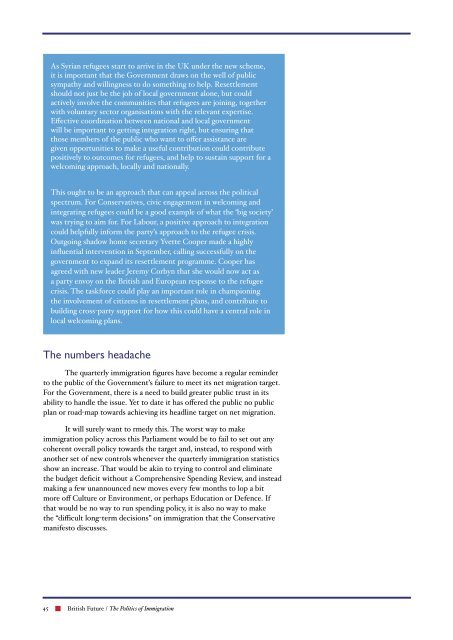THE POLITICS OF IMMIGRATION
The-politics-of-immigration
The-politics-of-immigration
Create successful ePaper yourself
Turn your PDF publications into a flip-book with our unique Google optimized e-Paper software.
As Syrian refugees start to arrive in the UK under the new scheme,<br />
it is important that the Government draws on the well of public<br />
sympathy and willingness to do something to help. Resettlement<br />
should not just be the job of local government alone, but could<br />
actively involve the communities that refugees are joining, together<br />
with voluntary sector organisations with the relevant expertise.<br />
Effective coordination between national and local government<br />
will be important to getting integration right, but ensuring that<br />
those members of the public who want to offer assistance are<br />
given opportunities to make a useful contribution could contribute<br />
positively to outcomes for refugees, and help to sustain support for a<br />
welcoming approach, locally and nationally.<br />
This ought to be an approach that can appeal across the political<br />
spectrum. For Conservatives, civic engagement in welcoming and<br />
integrating refugees could be a good example of what the ‘big society’<br />
was trying to aim for. For Labour, a positive approach to integration<br />
could helpfully inform the party’s approach to the refugee crisis.<br />
Outgoing shadow home secretary Yvette Cooper made a highly<br />
influential intervention in September, calling successfully on the<br />
government to expand its resettlement programme. Cooper has<br />
agreed with new leader Jeremy Corbyn that she would now act as<br />
a party envoy on the British and European response to the refugee<br />
crisis. The taskforce could play an important role in championing<br />
the involvement of citizens in resettlement plans, and contribute to<br />
building cross-party support for how this could have a central role in<br />
local welcoming plans.<br />
The numbers headache<br />
The quarterly immigration figures have become a regular reminder<br />
to the public of the Government’s failure to meet its net migration target.<br />
For the Government, there is a need to build greater public trust in its<br />
ability to handle the issue. Yet to date it has offered the public no public<br />
plan or road-map towards achieving its headline target on net migration.<br />
It will surely want to rmedy this. The worst way to make<br />
immigration policy across this Parliament would be to fail to set out any<br />
coherent overall policy towards the target and, instead, to respond with<br />
another set of new controls whenever the quarterly immigration statistics<br />
show an increase. That would be akin to trying to control and eliminate<br />
the budget deficit without a Comprehensive Spending Review, and instead<br />
making a few unannounced new moves every few months to lop a bit<br />
more off Culture or Environment, or perhaps Education or Defence. If<br />
that would be no way to run spending policy, it is also no way to make<br />
the “difficult long-term decisions” on immigration that the Conservative<br />
manifesto discusses.<br />
45 British Future / The Politics of Immigration


